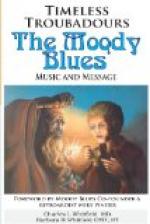Within the region thus described as Provencal, several separate dialects existed, as at the present day. Apart from the Franco-Provencal on the north-east, which we have excluded, there was Gascon in the south-west and the modern departements of the Basses and Hautes Pyrenees; Catalonian, the dialect of Roussillon, which was brought into Spain in the seventh century and still survives in Catalonia, Valencia and the Balearic Islands. The rest of the country may be subdivided by a line to the north of which c before a becomes ch as in French, cant_a_re producing chant_a_r, while southwards we find c(k) remaining. The Southern dialects are those of Languedoc and Provence; north of the line were the Limousin and Auvergne dialects. At the present day these dialects have diverged very widely. In the early middle ages the difference between them was by no means so great. Moreover, a literary [4] language grew up by degrees, owing to the wide circulation of poems and the necessity of using a dialect which could be universally intelligible. It was the Limousin dialect which became, so to speak, the backbone of this literary language, now generally known as Provencal, just as the Tuscan became predominant for literary purposes among the Italian dialects. It was in Limousin that the earliest troubadour lyrics known to us were composed, and this district with the adjacent Poitou and Saintonge may therefore be reasonably regarded as the birthplace of Provencal lyric poetry.
Hence the term “Provencal” is not entirely appropriate to describe the literary language of the troubadours, as it may also be restricted to denote the dialects spoken in the “Provincia”. This difficulty was felt at an early date. The first troubadours spoke of their language as roman or lingua romana, a term equally applicable to any other romance language. Lemosin was also used, which was too restricted a term, and was also appropriated by the Catalonians to denote their own dialect. A third term in use was the lingua d’oc, which has the authority of Dante [2] and was used by some of the later troubadours; however, the term “Provencal” has been generally accepted, and must henceforward be understood to denote the literary language common to the [5] south of France and not the dialect of Provence properly so-called.
For obvious reasons Southern France during the early middle ages had far outstripped the Northern provinces in art, learning, and the refinements of civilisation. Roman culture had made its way into Southern Gaul at an early date and had been readily accepted by the inhabitants, while Marseilles and Narbonne had also known something of Greek civilisation. Bordeaux, Toulouse, Arles, Lyons and other towns were flourishing and brilliant centres of civilisation at a time when Northern France was struggling with foreign invaders. It was in Southern Gaul, again, that Christianity




